International Translation Day 2023
28th September 2022
Every year on the 30th of September the world celebrates International Translation Day.
This day was created to pay tribute to the tireless work of translators, interpreters, and other language professionals all around the world. Translators play a crucial role in maintaining positive and transparent interpersonal communication around the world. International Translation Day honours the contribution of language professionals to global peacekeeping, the promotion of human rights, and the shared mission for sustainable development.
The day was adopted in the United Nations General Assembly on May 24th, 2017, to give these truly unique professionals a well-deserved global appreciation.
International Translation Day coincides with the feast day of St. Jerome, a biblical translator and scholar, who is traditionally regarded as the most learned of the Latin Fathers and the patron of translators.
This year’s International Translation Day (ITD) theme is Translation unveils the many faces of humanity. It recognises the important role that translation plays in our lives and celebrates our shared humanity.

Why celebrate International Translation Day?
Translation opens up a doorway to the rich tapestry of human experiences, providing us with a glimpse into unfamiliar cultures. In a world marked by climate disasters and geopolitical tensions that reverberate globally, translation plays an important role in addressing threats to peace and security, promoting diplomacy and multilateral cooperation, fostering sustainable development and humanitarian aid, upholding human dignity and safeguarding human rights.
The ability to convey structured language is a unique trait shared by humans, fulfilling our innate need for communication. Language is a channel for sharing information, ideas, and emotions among individuals. With thousands of languages spoken worldwide, ineffective communication can be a barrier to collaboration and mutual understanding.
Moreover, language gives us the power of expression and connection, which are indispensable for the functioning of society and well-being. Language rights, in essence, are human rights, giving everyone their right to use their preferred language of proficiency. For many, this becomes possible only with the invaluable assistance of translators and interpreters. Ensuring that no one is left behind by speaking to and understanding everyone, particularly in times of adversity and crisis, where the ability to comprehend one’s surroundings and be understood can be a matter of survival. Translators and interpreters serve as the catalysts for this essential communication.
In humanitarian contexts, translators and interpreters are a lifeline for the most vulnerable people. These compassionate and humane individuals stand as symbols of hope, aiding those fleeing crises, whether stemming from war, famine, disasters, or climate-related emergencies. They give those in crisis their humanity, granting them access, agency, dignity, and the chance to connect. These translators and interpreters become the human embodiment of advocacy and diplomacy, ensuring that communication persists even in the most challenging circumstances.
Thanks to their studies in the humanities, translators, and interpreters possess a deep understanding of cultural, political, ethical, equitable and tolerant issues. They are deeply dedicated to their work and the people they assist. During the peak of the pandemic, interpreters bravely stood their ground at hospital posts to ensure patients could understand doctors and doctors could treat their patients, often putting their own well-being at risk. The realms of culture, global development, security, and enduring peace are fundamentally human concerns and they are served by professionals who understand the importance of their role.
Translators bridge individuals from opposite corners of the world through stories and the simple act of reading. Literary translation dismantles the cultural and linguistic barriers, unveiling the essence behind each story. It enables readers to see themselves reflected in the text, even if they do not speak the author’s language.
How to celebrate ITD?
There are many ways you can show appreciation to all the language professions and celebrate ITD by learning a new language, promoting ethnic diversity or calling a friend in another country you’ve not spoken to in a while.
Every International Translation Day, English PEN hosts a programme of talks, workshops and networking opportunities for literary translators.
The programme for this year can be found here: https://www.englishpen.org/international-translation-day/itd-2023-nationwide-programme/
